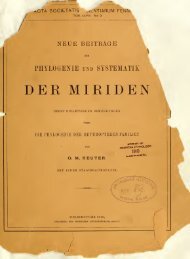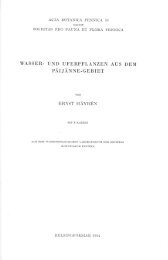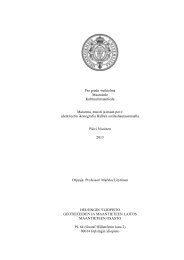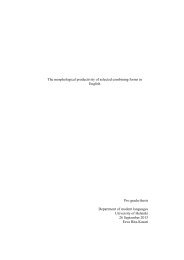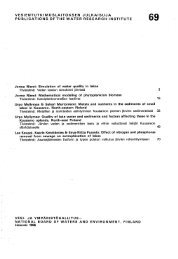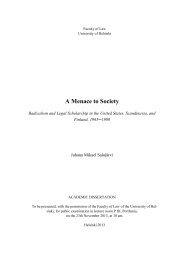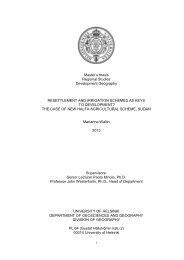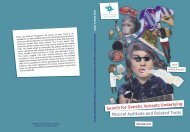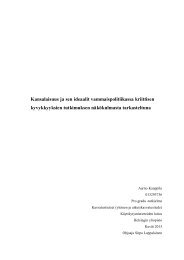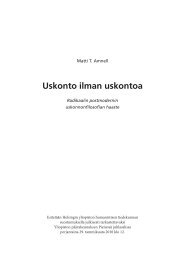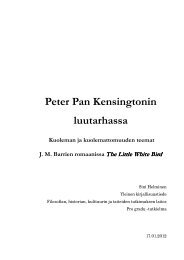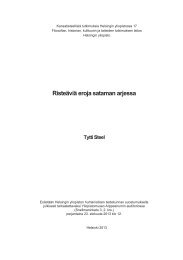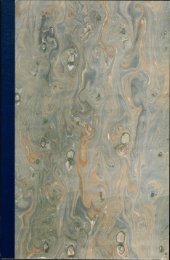Modern surgical treatment of otosclerosis - Helda - Helsinki.fi
Modern surgical treatment of otosclerosis - Helda - Helsinki.fi
Modern surgical treatment of otosclerosis - Helda - Helsinki.fi
Create successful ePaper yourself
Turn your PDF publications into a flip-book with our unique Google optimized e-Paper software.
Review <strong>of</strong> the literature<br />
examination revealed annular stapediovestibular calci<strong>fi</strong>cation or <strong>fi</strong>brosis without<br />
histological otosclerotic focus. These latter specimens and all 25 control bones lacked<br />
evidence <strong>of</strong> measles RNA. Similarly, the expression <strong>of</strong> a virus binding receptor (CD46)<br />
was increased substantially in footplates with a histological focus. Measles virus RNA has<br />
been thought to be evidence <strong>of</strong> the presence <strong>of</strong> a vital virus because without active viral<br />
replication, RNA rapidly disintegrates.<br />
Epidemiological reports <strong>of</strong> a decreased incidence <strong>of</strong> <strong>otosclerosis</strong> after a measles<br />
vaccination programme also support the presence <strong>of</strong> a viral aetiology (Vrabec and Coker<br />
2004, Arnold et al. 2007). Arnold et al. (2007) presented a study <strong>of</strong> 64 112 patients with<br />
<strong>otosclerosis</strong> in Germany in 1993-2004. He found a signi<strong>fi</strong>cantly decreased incidence <strong>of</strong><br />
hospital <strong>treatment</strong>s for <strong>otosclerosis</strong> in vaccinated patients during this time period as<br />
compared with unvaccinated individuals. The effect was more marked among men than<br />
among women. In Germany, the measles vaccine has been available since 1974 (Arnold et<br />
al. 2007). Paradoxically, there is actually a lower incidence <strong>of</strong> <strong>otosclerosis</strong> in undeveloped<br />
countries, where measles continues to be widespread (Uzicanin et al. 2002, Tshifularo and<br />
Joseph 2005).<br />
Endocrinological factors<br />
Pregnancy has been suggested to cause onset or progression <strong>of</strong> <strong>otosclerosis</strong>. The incidence<br />
<strong>of</strong> the disease is more common in women, and some studies have shown that pregnancy<br />
can aggravate symptoms (Precechtel 1967, Gristwood and Venables 1983). Lippy et al.<br />
(2005) criticized former studies for being uncontrolled and lacking age-adjustment. His<br />
age-adjusted study <strong>of</strong> 94 otosclerotic women revealed no negative effect on any outcome<br />
measurements (hearing levels, age at time <strong>of</strong> surgery, incidence) caused by pregnancy<br />
(Lippy et al. 2005). Abnormal parathyroid hormone function is another factor postulated<br />
to be involved in the aetiopathogenesis <strong>of</strong> <strong>otosclerosis</strong>. Grayelin et al. (1999) showed that<br />
expression and function <strong>of</strong> parathyroid hormone receptors in otosclerotic stapes footplates<br />
were lower than in bones collected from the external ear canal. However, in the same<br />
article, he concluded that this is probably not the triggering event in pathogenesis, but a<br />
consequence <strong>of</strong> abnormal regulation <strong>of</strong> bone matrix protein metabolism caused by another<br />
aetiological factor like measles infection. Similarly, glucocorticoids and the reninangiotensin-aldosterone<br />
system have altering effects on bone remodelling <strong>of</strong> otosclerotic<br />
bone in in vitro studies, but these are more likely to be epiphenomena <strong>of</strong> the disease<br />
(Imauchi et al. 2006, 2008).<br />
Immunological factors<br />
Otosclerosis being an autoimmune disease was suggested by Yoo (1984). He detected<br />
elevated levels <strong>of</strong> the collagen II antibody in otosclerotic patients compared with controls.<br />
In a study <strong>of</strong> rats with lesions resembling human <strong>otosclerosis</strong>, raised titres <strong>of</strong> antibody to<br />
19



